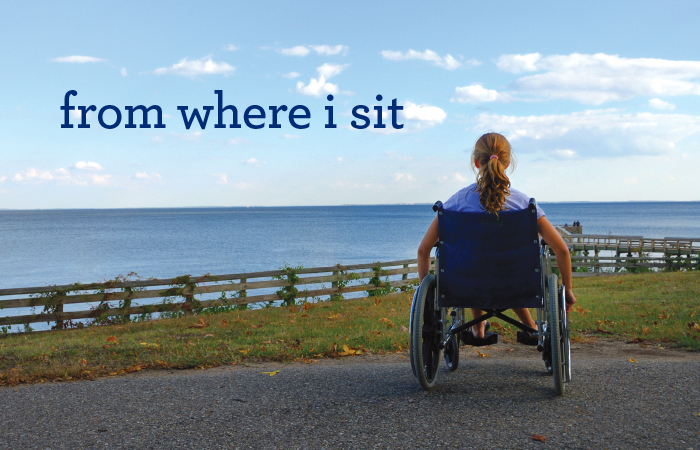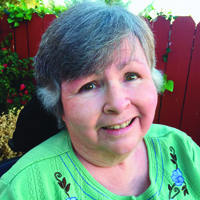
An Attitude of Gratitude

Choosing to see life’s unexpected detours as opportunities to appreciate the scenic route
Life is certainly full of surprises, isn’t it? Just when you think you’ve figured things out, you round a curve and — surprise — you hit a detour!

Being diagnosed with ALS (amyotrophic lateral sclerosis), also known as Lou Gehrig’s disease, in 2012 at age 55 was a most unwelcome detour, to put it mildly. We were not completely taken by surprise since it had been clear something was wrong with me for quite some time. When tests and clinical observations eventually ruled out everything else, we were faced with the awful truth: I had a disease that would take away my mobility, my independence and, eventually, my life. Scientists are working hard to find answers. But as I write this, there is no effective treatment or cure for ALS.
So how does one cope with having a physical disability as an active adult? What class can you take? Where do you turn?
For me, my Christian faith has been my unending source of strength, comfort and joy. When I am always striving to count my blessings, there is no room for pity parties — though they do sneak in from time to time. Nobody’s perfect.
It might sound strange to talk about gratitude and a terminal, disabling disease in the same breath. But my faith teaches me to “give thanks in all circumstances” (1 Thessalonians 5:18). But how does someone find anything to be thankful for with a diagnosis like mine? Let me explain.
It begins with a little perspective. We are all “terminal,” really. How many people do you know who cannot die? You may know some who “cheated death” a time or two by surviving an accident, illness or disaster against improbable odds. This happens. But nobody lives forever. There are no guarantees in life, so we need to savor every precious moment. Carpe diem!
Since we know each day is a gift, unique and finite, pause for a moment to consider what makes it so. What senses are you using right now? Be thankful for them.
Once you open up to the idea that there just might still be some good in the world, and in your life, you begin to see it. It may seem small and insignificant, at least at first. But if it’s good, notice it. Acknowledge it. Give thanks for it.
A cooling breeze. Your dog’s happy greeting. That lady who held the elevator door for you. A memory that makes you smile. All are reasons for gratitude
For me, since I have been dealing with the challenges ALS presents, I am amazed by the number of things I now notice because I am more “tuned in.” When you are forced into stillness, you have two choices: You can fight it and be angry and bitter all the time; or you can embrace it and allow your senses to make you aware of all you can still appreciate.
There are the little everyday things as I’ve already mentioned. But, oh, there is so much more! For example, the increased public awareness of ALS brought about by the 2014 Ice Bucket Challenge led to millions of dollars in donations, helping to fund more research that, one day, will lead to a cure. The public awareness alone is a big help to people with ALS. This is something for which I am very grateful.
Because this disease invaded our lives, we chose to join an MDA ALS support group. There, in addition to practical and emotional support, we have met some of the world’s nicest people who soon became dear friends. Each one I count as a blessing. Yes, ALS is the reason we meet, but it is also what helps us connect in a very unique way. These people get it. And that is truly something for which to be thankful.
I also am particularly grateful that, if I had to get ALS, it happened at a time and place where technology has completely changed the way we interact with the world around us — from smartphone apps to the eye-tracking device I used to type these words. (Yes, I am able to write using only my eyes!)
Years ago, people with ALS who lost the use of their hands and their voices were cut off from the world, unable to communicate at all. The sense of isolation must have been so frightening.
In addition to communication aids, there are other tools that make the journey with a disability safer for me and those who care for me. These include a hospital bed, power wheelchair, a van with a ramp, a special shower chair and a Hoyer lift. What a blessing such products are to so many.
From practical help to loving friends; from music, art and books to movies, sports and technology, there is so much life that surrounds me. For these and for so much more, I am grateful.
Sometimes detours offer some of the most amazing views. You just need to keep your eyes open.
Patty Blake, 59, was diagnosed with ALS in 2012 and began writing about this journey on her blog. She lives with her husband, Alan, in Southern California.
MDA Resource Center: We’re Here For You
Our trained specialists are here to provide one-on-one support for every part of your journey. Send a message below or call us at 1-833-ASK-MDA1 (1-833-275-6321). If you live outside the U.S., we may be able to connect you to muscular dystrophy groups in your area, but MDA programs are only available in the U.S.
Request Information